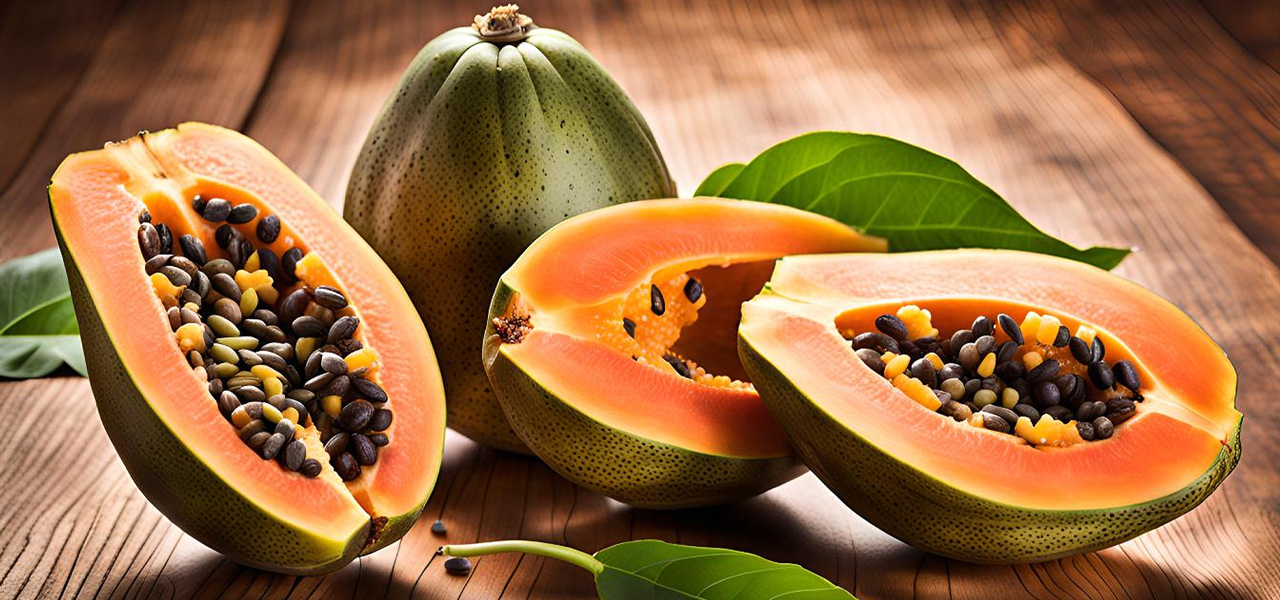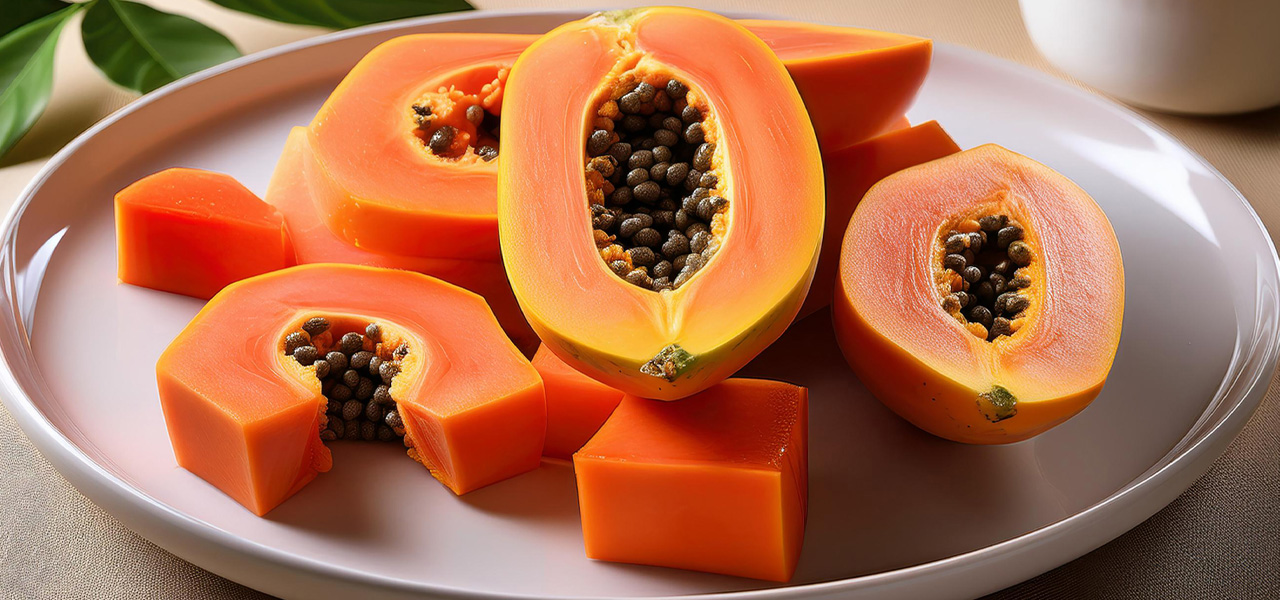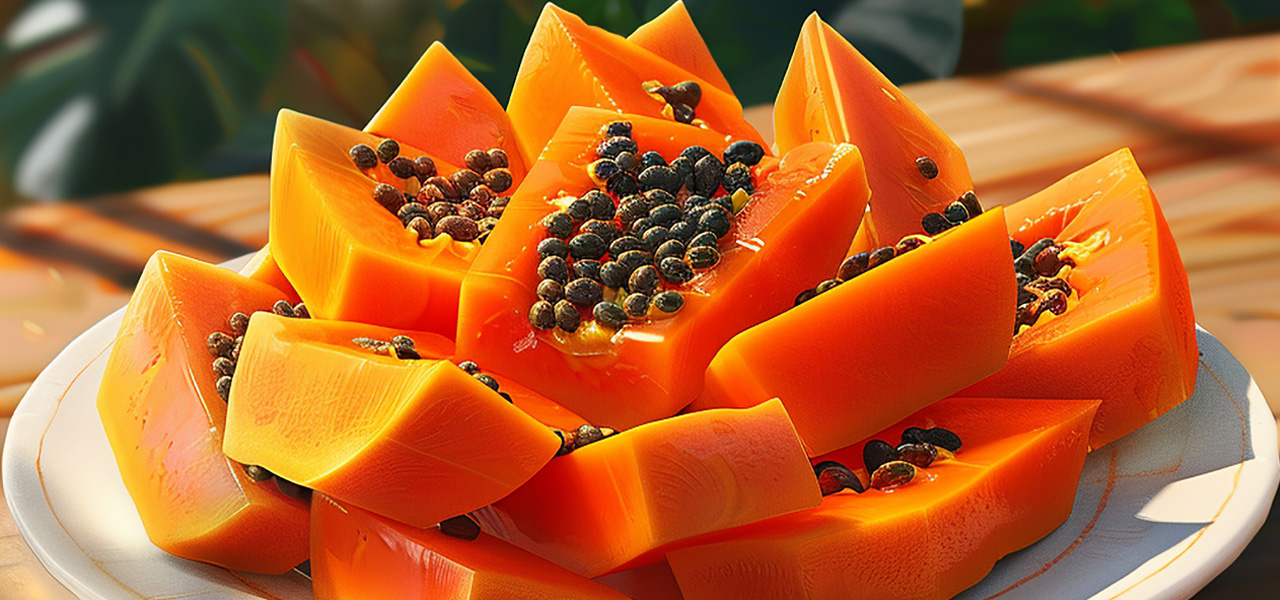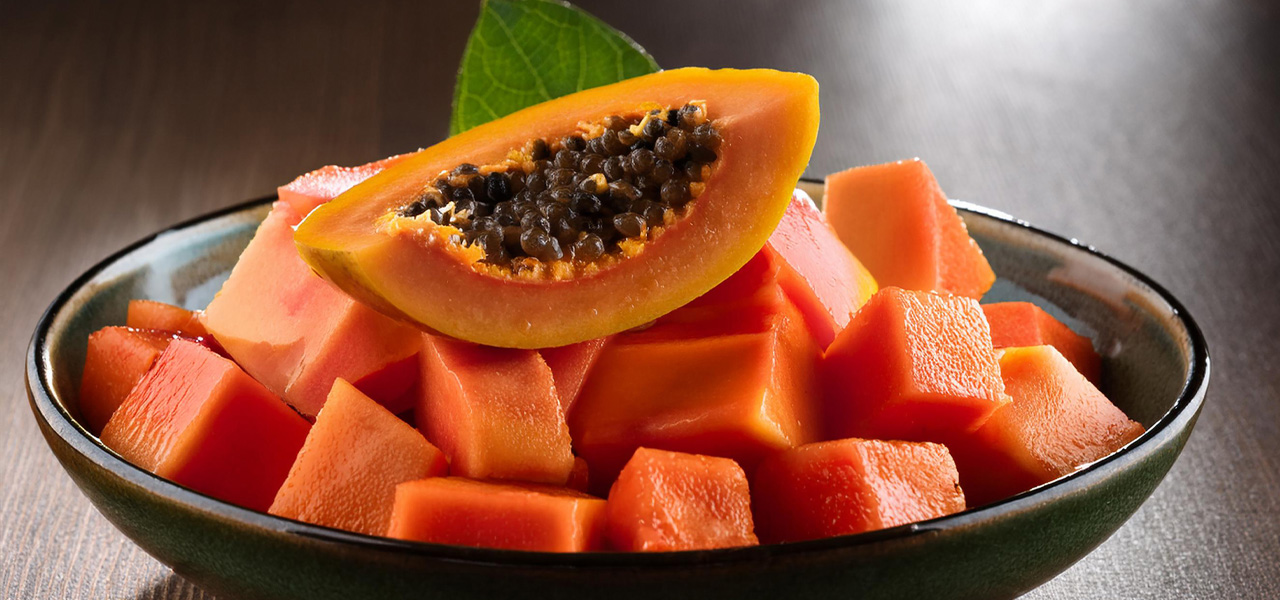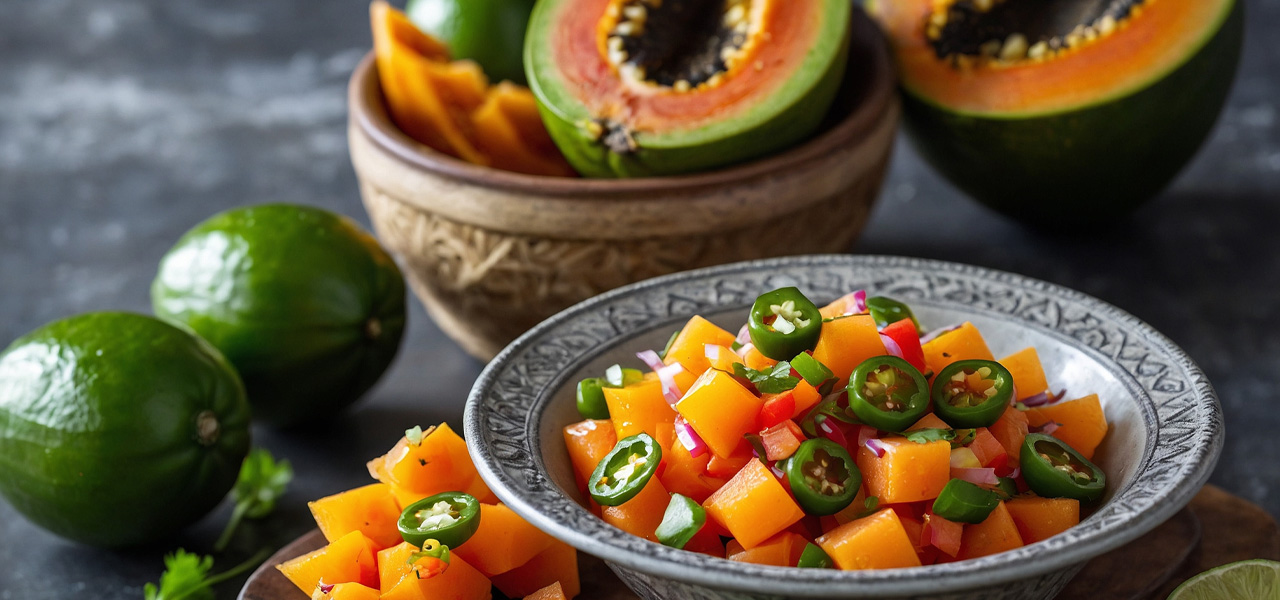Introduction
Papaya, also known as Carica papaya, is a tropical fruit that has gained immense popularity not only for its delightful flavor but also for its remarkable health benefits. With its vibrant orange flesh and sweet, juicy taste, papaya is a favorite among fruit lovers around the world. This blog will explore the numerous benefits of papaya, its nutritional profile, and how you can incorporate this tropical wonder into your diet for optimal health.
What is Papaya?
Papaya is a fruit that originates from the tropical regions of the Americas, particularly Mexico and Central America. It belongs to the Caricaceae family and is characterized by its large size, green skin when unripe, and bright orange or yellow flesh when ripe. The fruit contains a central cavity filled with black seeds that are also edible.
Papaya is often referred to as the “fruit of the angels” due to its numerous health benefits and delicious taste. It’s commonly enjoyed fresh, but can also be used in smoothies, salads, desserts, and even savory dishes.
Nutritional Profile of Papaya
Papaya is not just a tasty fruit; it is also a nutritional powerhouse. Here’s a breakdown of its impressive nutritional profile per 100 grams of raw papaya:
- Calories: 59
- Carbohydrates: 15 grams
- Dietary Fiber: 1.8 grams
- Sugars: 11 grams
- Protein: 0.5 grams
- Fat: 0.4 grams
- Vitamin C: 60.9 mg (68% of the Daily Value)
- Vitamin A: 1274 IU (25% of the Daily Value)
- Folate: 37 mcg (9% of the Daily Value)
- Potassium: 182 mg (4% of the Daily Value)
- Magnesium: 21 mg (5% of the Daily Value)
Vitamins and Minerals
- Vitamin C: Papaya is a rich source of vitamin C, which is essential for immune function, skin health, and the absorption of iron from plant-based foods.
- Vitamin A: The high levels of beta-carotene in papaya convert to vitamin A in the body, supporting vision, skin health, and immune function.
- Folate: This B-vitamin is crucial for cell division and is particularly important for pregnant women to support fetal development.
- Potassium: Papaya is a good source of potassium, which helps regulate blood pressure and supports heart health.
- Antioxidants: Papaya contains antioxidants like lycopene and flavonoids, which help combat oxidative stress and reduce the risk of chronic diseases.
Health Benefits of Papaya
- Aids Digestion
Papaya is renowned for its digestive benefits. It contains an enzyme called papain, which aids in breaking down proteins in the digestive system. This makes it particularly useful for those who suffer from digestive issues, such as bloating or indigestion. Consuming papaya can help ease digestive discomfort and promote regular bowel movements.
- Boosts Immune System
The high vitamin C content in papaya plays a significant role in boosting the immune system. Regular consumption of papaya can help the body fight off infections and diseases. Additionally, the antioxidants in papaya help combat free radicals, which can lead to chronic diseases and weaken the immune system.
- Promotes Healthy Skin
Papaya is often used in skincare products due to its skin-enhancing properties. The vitamins A, C, and E found in papaya help improve skin texture and complexion. The antioxidants in papaya also protect the skin from damage caused by UV rays and pollution, reducing the appearance of fine lines and wrinkles. Applying mashed papaya on the skin can also help soothe sunburn and reduce inflammation.
- Supports Heart Health
Papaya contributes to heart health in several ways. The antioxidants, fiber, and potassium in papaya work together to lower cholesterol levels and regulate blood pressure. By reducing oxidative stress and inflammation, papaya may lower the risk of heart disease and stroke.
- Aids Weight Management
If you’re looking to manage your weight, papaya can be a beneficial addition to your diet. Low in calories and high in fiber, papaya can help you feel full for longer, reducing the urge to snack on unhealthy foods. Incorporating papaya into your meals can promote satiety and support weight loss efforts.
- Enhances Eye Health
The vitamin A content in papaya is essential for maintaining good vision. It helps prevent night blindness and age-related macular degeneration. The antioxidants in papaya also protect the eyes from oxidative damage, promoting overall eye health.
- Regulates Blood Sugar Levels
Studies suggest that papaya may help regulate blood sugar levels, making it a beneficial fruit for individuals with diabetes. The fiber in papaya slows down the absorption of sugar in the bloodstream, preventing spikes in blood sugar levels. However, it’s essential to consume papaya in moderation as part of a balanced diet.
- Supports Bone Health
Papaya is a source of vitamin K, which plays a crucial role in maintaining bone health. Adequate vitamin K intake is associated with improved bone density and reduced risk of fractures. Additionally, the calcium and magnesium in papaya contribute to strong bones.
- Promotes Wound Healing
The enzymes and vitamins in papaya can aid in wound healing. Papain helps remove dead tissue from wounds and promotes the growth of new tissue. Additionally, the anti-inflammatory properties of papaya can help reduce swelling and pain associated with injuries.
- Acts as an Anti-Inflammatory
Chronic inflammation is linked to various health issues, including arthritis, heart disease, and cancer. Papaya’s anti-inflammatory properties can help reduce inflammation in the body, potentially lowering the risk of these chronic conditions.
How to Incorporate Papaya into Your Diet
Adding papaya to your diet is easy and delicious. Here are some creative ways to enjoy this tropical fruit:
- Fresh Fruit Salad
Combine diced papaya with other fresh fruits like mango, pineapple, and berries for a colorful and refreshing fruit salad. Drizzle with lime juice for an extra zing.
- Smoothies
Blend papaya with yogurt, spinach, and a banana to create a nutrient-rich smoothie. This makes for a great breakfast or post-workout snack.
- Salads
Add papaya to your salads for a sweet and tropical twist. Pair it with mixed greens, nuts, and a light vinaigrette for a refreshing dish.
- Salsas
Chop papaya and mix it with diced tomatoes, onions, cilantro, and lime juice to create a vibrant salsa. Serve it with grilled fish or chicken for a delicious meal.
- Desserts
Incorporate papaya into desserts by using it in tarts, puddings, or as a topping for yogurt and ice cream.
- Cooking
Use green (unripe) papaya in savory dishes such as curries or stir-fries. Its firm texture can add a unique element to your meals.
Precautions and Considerations
While papaya is generally safe for most people, there are some considerations to keep in mind:
- Allergic Reactions: Some individuals may be allergic to papaya. If you experience itching, swelling, or difficulty breathing after consuming it, seek medical attention immediately.
- Pregnancy: While ripe papaya is safe to eat during pregnancy, unripe papaya should be avoided, as it contains latex that may induce contractions.
- Diabetes: Individuals with diabetes should consume papaya in moderation due to its sugar content, but it can still be a healthy option when part of a balanced diet.
Conclusion
Papaya is more than just a delicious tropical fruit; it’s a nutritional powerhouse packed with health benefits. From aiding digestion to promoting skin health and supporting the immune system, incorporating papaya into your diet can significantly enhance your overall well-being. So, the next time you see this vibrant fruit, don’t hesitate to enjoy its natural sweetness and remarkable health benefits!
Whether you eat it fresh, blend it into smoothies, or add it to salads, papaya is a versatile fruit that can elevate your culinary experience. Embrace the goodness of papaya and savor its delightful flavor while reaping its incredible health benefits today.


